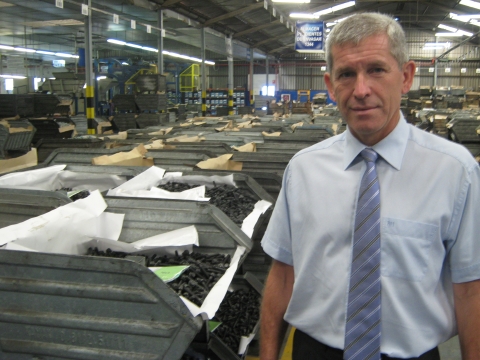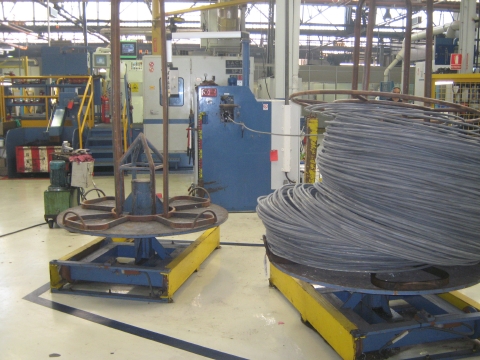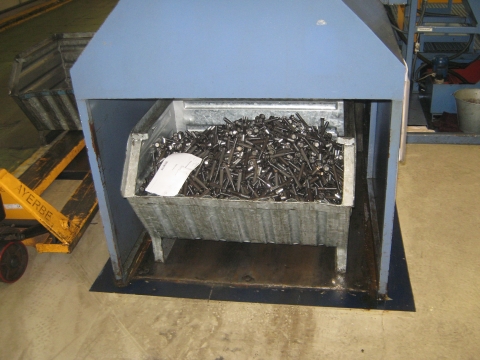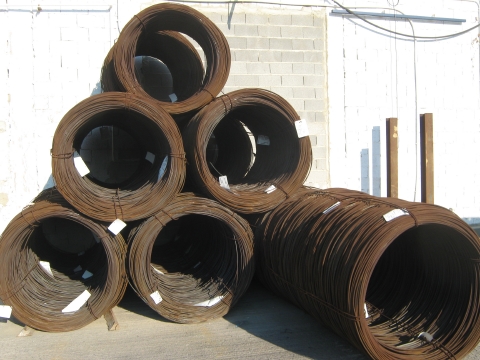In English, when we talk about the basics, we often refer to the nuts and bolts of the matter.

If you drive a car then there’s a pretty good chance that it’s held together by the nuts and bolts manufactured in Museros, Valencia, at the KAMAX plant.
In 1935 a German engineer, Rudolf Kellermann, established a company called ‘Rudolf Kellermann Fabrik für Gewindeteile’ in Osterode am Harz, Germany. With no capital and a staff of three he started making bolts for the automotive industry in an old barrel factory.
Within three years there were 76 people working in a new factory and after major investments in new machines, the business expanded its range and also made small parts for aircraft manufacturing.
Don’t mention the war!
In 1955 a second plant started production in Homberg (Ohm) as the original plant had reached its limit with 1,000 workers processing over 6,000 tons of steel parts.
The following year saw the introduction of the ‘Kellermann-Klein’ formula, which is still the global standard for establishing tightening torques in accordance with DIN/EN/ISO 16047.
In 1970 a third plant was built at Alsfeld, and three years later KAMAX’s founder died in Switzerland, leaving the company in the hands of the next generation.

The following year, 1974, saw KAMAX internationalising, supplying the US car industry directly, and in 1980 prouction also crossed frontiers with the establishment of the first of seveal foreign production centres, in Museros, Valencia, when KAMAX took over the Spanish bolt manufacturer TUSA, which had been manufacturing car parts since 1952, long befoere Ford set up its production plant in nearby Almussafes.
In1992 a fifth plant was set up in the Czech Republic at Turnov, and in 1995 global production began with the takeover of G.P. DUPONT plants in Detroit, Michigan.
In 2004 KAMAX started supplying Chinese manufacturers and by 2010 they had sales companies in China and Japan.
The three original employees are no longer with the firm, but KAMAX today employs 3,000 people, 215 of them in Valencia, and has a global revenue of € 590 million, and customers such as AUDI, BMW, SEAT, Fiat, Skoda, Ford, Opel, Suzuki, Chrysler, Honda, Peugeot, Thyssen Krupp, Porsche, Renault and Volvo.
The nuts and bolts of any manufacturing process are of course the nuts and bolts, and modern internal combustion engines are subject to a constant optimization process in terms of performance and production. This results in ever increasing demands on fasteners.

“KAMAX engine bolts are developed and produced to satisfy the multiple requirements in respect to, loading, environment influences and economic aspects. The range covers all types of fasteners from flange bolts for conventional chassis fastenings to special applications, such as track and rake adjustments as well as fasteners in the steering or braking system”.
Obviously I didn’t write that, but when I go to a restaurant, I always like to order something on the menu that I don’t know or understand; just to live a little dangerously. When I visit a factory, I like to encounter something new and incomprehensible, such as knurled-wheel studs. I’m still not sure what they are but in Kamax they apparently make the best ones on the market, and right here in Valencia.
Juan Carlos Mena is a Valencian economist who has been the Financial Manager of KAMAX since 1992, running the company in close collaboration with the German engineer Manfred Weidner.
KAMAX produces the staggering sum of two million bolts a day at its Museros factory, 90% of which is exported; mostly within the European Union, although about 7% goes to China, redressing the Spanish trade deficit.
The success of the company, as Juan Carlos points out, is internationalisation, something his knows quite a lot about. His son in law is Welsh.
Although it is a German company, only about 3% of the staff is German, and the official language of the company is English.
One of KAMAX’s secrets is the close relationship they have with their customers, tailoring their production operations to the specific needs of each client. Demand and Supply if you like.
Have you ever noticed how cars these days have a way of sneaking up on you? Continuous tightening of the laws on noise levels in vehicles as well as ever-increasing demands for comfort demand innovative solutions. If noise or vibration transmission needs to be reduced, the resonance bodies have to be separated from the source of vibration. This is achieved by using grommets which do not transmit the noise.
If you believe that bolt manufacturing isn’t uplifting, you should be aware that transversely loaded bolted joints tend to come loose on their own. KAMAGIC® is an innovative solution which combines protection against loosening with multiple applications. KAMAGIC® bolts can be disassembled as often as required without losing their self-locking function.
KAMAX is a company that believes in its Spanish future, and for this reason it is planning to open a small school for apprentices at the company in spring 2014, to continue guaranteeing local employment (the company is actually increasing staff despite the process). Traing is a great priority at the company, and they are proud of the fact that one of the workers who trained in Museros is now employing his skills in one of the German factories of the company.
The manufacture of 500 different types of bolts on 17 production lines is a very Spanish affair; the coils of steel coming from Asturias and Cantabria, and the only outsourced part of the production process taking place at L’Olleria.
Speaking of nuts and bolts; not many people know this, but the origin of the word ‘doughnut’ is the fact that, like bread, it is made with dough, and shaped like a nut; not the peanut kind, but the one used to tighten a bolt.
